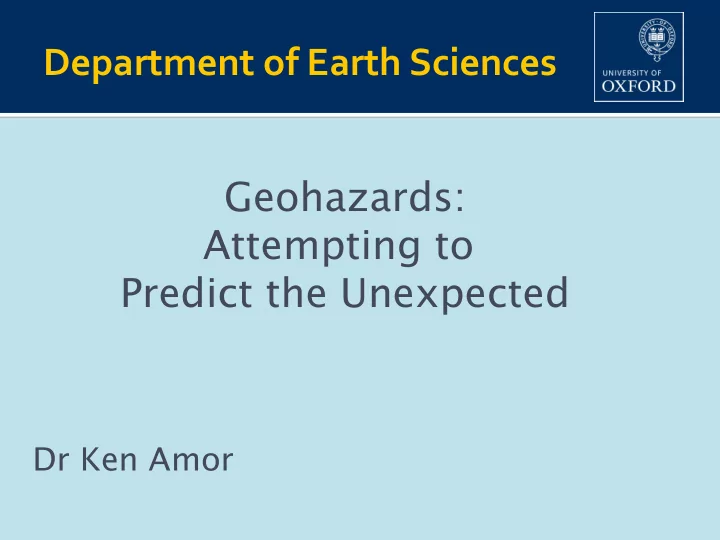

Department of Earth Sciences Geohazards: Attempting to Predict the Unexpected Dr Ken Amor
Our Perception of Time and Risk Two views of the Geological time scale
Faults and Earthquakes Earthquakes occur at fault-planes (fractures in the Earth's crust) Crustal movement causes stress in rocks which deform elastically (rate of cm/yr) Earthquakes occur when internal strength of the rock is exceeded releasing enormous energy (elastic rebound theory)
Rocks deform elastically
Rocks deform elastically Lulworth Cove, Dorset An example of rocks behaving elastically under stress
Real Time Earthquake Map http://earthquake.usgs.gov/earthquakes/map/
Historical Data – Japanese Cultural context The Great Wave off Kanagawa by Hokusai
Historical Data – Tsunami stone Japanese tsunami stones, dating back to the 15 th Century. “Do not build your homes below this point!”
Mapping crustal movements with INSAR Radar satellites transmit electromagnetic waves illuminating an area of the Earth's surface. They record the amplitude and phase of the waves that bounce back.
Mapping Crustal deformation
British Earthquakes http://mapapps.bgs.ac.uk/geologyofbritain/home.html?mode=earthquakes
British Earthquakes
Vesuvius and Pompeii AD 79 Eruption of Vesuvius by William Turner
Vesuvius 1944 Eruption
Vesuvius and Naples - 2013 Mt Vesuvius today – Nasa earth observatory
Mapping volcanoes with INSAR Small surface displacements (uplift of around 9 cm) of the Longonot Volcano, Kenyan Rift Valley. The Suswa volcano in the background shows no such uplift at this time
Chelyabinsk Meteor Dawn 15 th Feb 2013 a 17m diameter asteroid enters the atmosphere
Tunguska – 30th June 1908 Exploded 8km above surface Estimated diameter 50 – 100m 700 square miles of forest devastated
Amazon Rainforest – 13th August 1930
Peru Sept 2009 An ordinary chondrite survived the passage through the atmosphere. Estimated diameter 2m
Frequency of meteorite strikes A once in 100 year event or a once in 20 year event?
Asteroid map A crowded solar system! Armagh observatory
Asteroid detection Spotting the needle in the haystack
Citizen Science Projects http://www.asteroidzoo.org/
CO2 and the carbon cycle – Climate Change, its complicated
Climate Change observations Source IPCC website
Climate projections
Palaeo-climate change
7 billion and me! Source BBC website
Annual Global Energy Budget 1 exajoule = 10 18 Joules Annual global energy use = 452 exajoules Predicted to rise to 600 exajoules by 2050 UK energy use ~ 8 exajoules
Climate Change Documentary http://thiniceclimate.org/
Contact enquiries @ earth.ox.ac.uk www.earth.ox.ac.uk SCIENCE OPEN DAYS Wed 2 nd and Thurs 3 rd July 2014 Fri 19 th Sept 2014
Admissions requirements EARTH SCIENCES A2 Maths required for entry any year, PLUS EITHER Physics OR Chemistry for entry 2013 onwards Recommended A levels: Physics , Chemistry, Maths, Biology, Further Maths. A2 Geology NOT required. Typical offer A*AA or AAAA
Mineral Resources
Recommend
More recommend